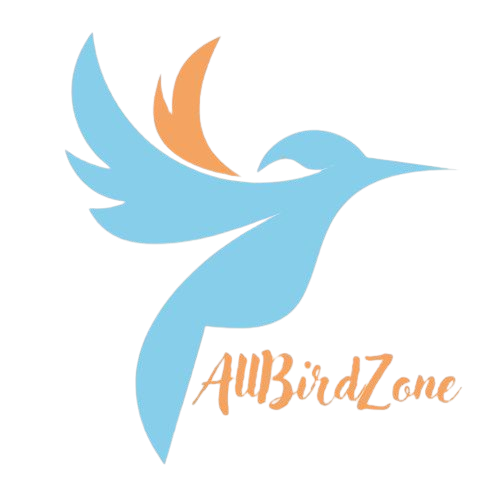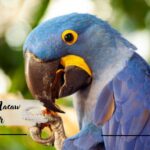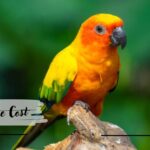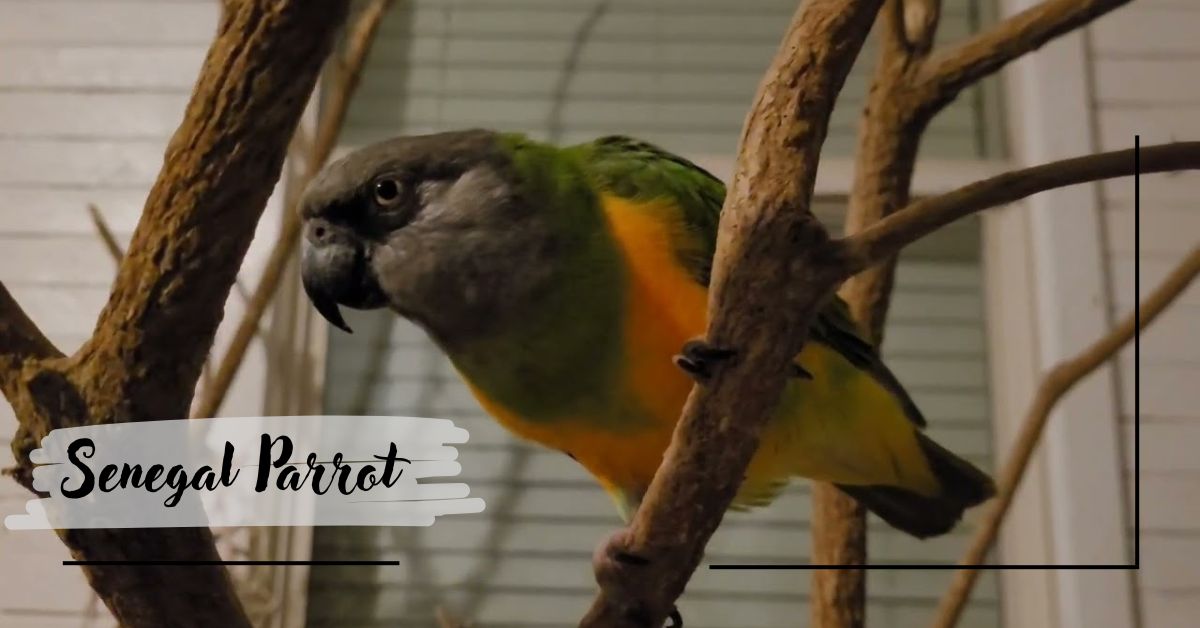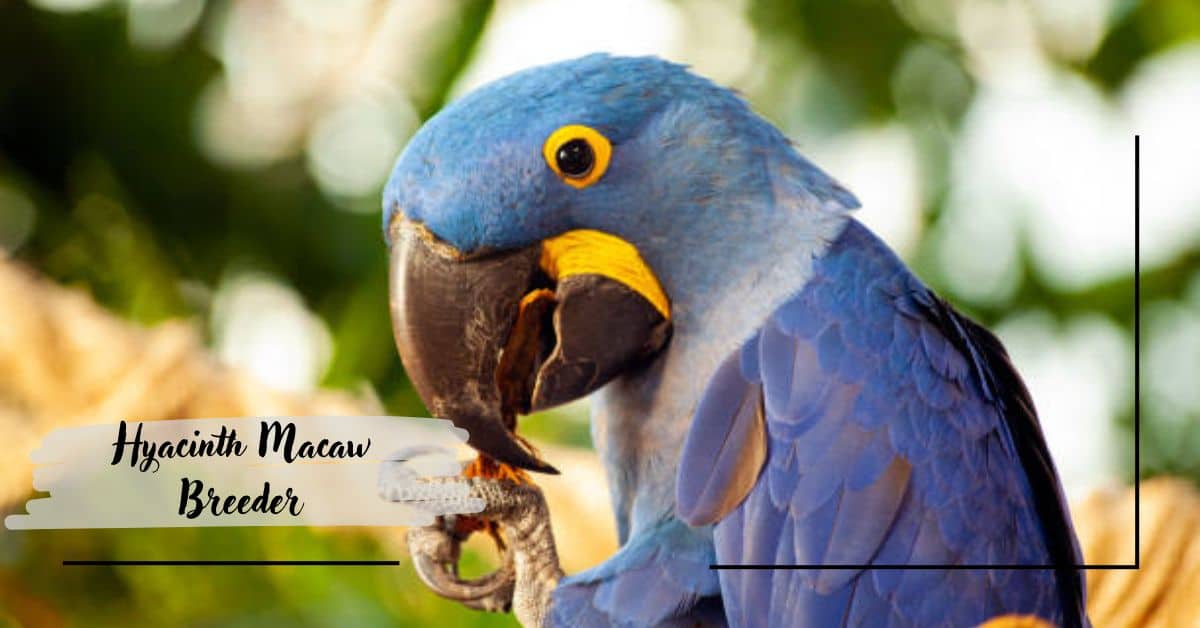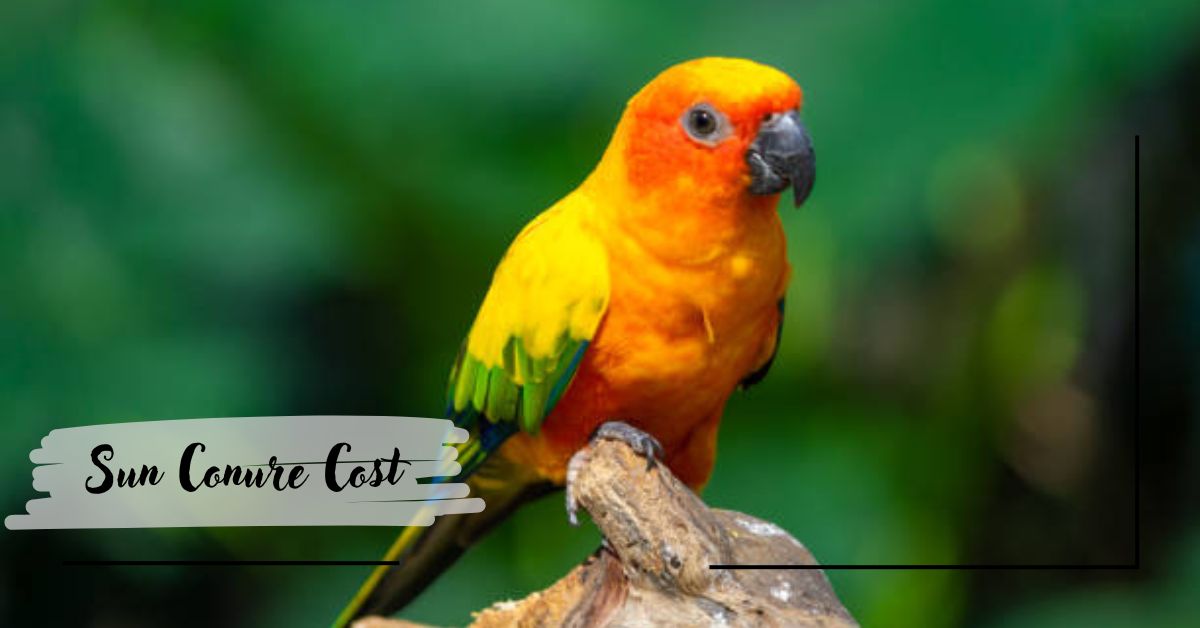The Senegal Parrot is a small, colorful bird known for being friendly and playful. These birds are popular pets because they are affectionate and can form close bonds with their owners. Senegal Parrots usually weigh between 120 and 150 grams and are about 9 inches (23 cm) long, which makes them a good size for many homes. They have a bright green body, a gray head, and a yellow or orange belly, making them visually striking. Senegal Parrots are curious and love to explore their surroundings, which keeps them entertained and engaged. With proper care and attention, they can become very loving companions. Plus, they are quieter than many other parrots, making them an excellent choice for people living in apartments or smaller spaces.
Senegal Parrot Appearance Table:
| Feature | Details |
| Common Names | Senegal Parrot, Yellow-bellied Parrot |
| Scientific Name | Poicephalus senegalus |
| Color | Green body, gray head, yellow/orange belly |
| Size | Approximately 9 inches (23 cm) |
| Lifespan | 20-30 years or more |
| Sounds | Chirps, whistles, some mimicry |
| Interaction | Affectionate, playful, enjoys social interaction |
Senegal Parrots make wonderful companions with their lively personalities and unique charm. If you’re considering one as a pet, ensure you’re ready for the commitment and joy they bring to your life.
Where is the Native Region / Natural Habitat of the Senegal Parrot?
The Senegal Parrot is native to West Africa. Its natural habitat includes:
- Forest edges
- Wooded savannas
- Open woodlands
These parrots thrive in areas with plenty of trees, which provide food sources and nesting sites. In the wild, they often form small flocks and are seen foraging for seeds, fruits, and nuts.
How to Care for and Feed a Senegal Parrot
Caring for a Senegal Parrot involves providing a good diet, a comfortable home, and social interaction. Here’s a quick guide:
Diet:
Feed your Senegal Parrot high-quality pellets, which should be their main food. Offer fresh fruits like apples and bananas, and vegetables like carrots and leafy greens daily. Seeds can be given occasionally but should not be the main food. Always provide clean, fresh water, changing it daily.
Cage Setup:
Choose a spacious cage, at least 24 inches wide and deep. Include various perches for foot health and add plenty of toys to keep your parrot entertained. Rotate the toys often to keep them interesting.
Social Interaction:
Spend time with your Senegal Parrot every day. Talk to them, play, and engage in training sessions. Use treats to encourage good behavior. Allow them supervised time outside the cage to explore and play safely.
What is the Personality and Behavior of a Senegal Parrot?
Senegal Parrots are renowned for their affectionate and playful personalities, often forming strong bonds with their owners by showing affection through cuddling and preening. They are highly playful, thriving on toys, puzzles, and games that keep them active and entertained. Their intelligence allows them to learn tricks and commands, making them engaging companions. Additionally, their curious nature drives them to explore their environment, adding to their charm and making them delightful pets for those who appreciate interactive and loving birds.
How Does a Senegal Parrot Communicate Through Speech and Sound?
Senegal Parrots communicate through a combination of mimicry, vocalizations, and body language. While they are not known for an extensive vocabulary, they can learn to mimic a few words, especially when spoken frequently by their owners. In addition to mimicry, these parrots produce various sounds, including chirps, whistles, and squawks, to express their feelings. Their body language also plays a crucial role in communication; movements like head tilting and feather fluffing convey different emotions, allowing them to interact effectively with their environment and the people around them.
What Are the Health Concerns and Common Conditions for a Senegal Parrot?
Obesity:
Senegal Parrots can get overweight if they eat too much. It’s important to watch their diet and give them the right amount of food. Offer fresh fruits and vegetables along with pellets and seeds to keep them healthy.
Feather Plucking:
Sometimes, these birds may pull out their feathers if they feel bored or stressed. To help prevent this, make sure they have plenty of toys and spend time playing with them. Changing their environment, like adding new toys or moving things around, can also reduce stress.
Respiratory Issues:
Good air quality is essential for their health. Keep their space clean and well-ventilated to avoid breathing problems. Also, make sure there is no dust, mold, or smoke in the area, as these can make them sick.
Vitamin Deficiencies:
A varied diet is vital to keep them healthy. Ensure they get enough vitamins, especially vitamin A and calcium. You can provide these through dark leafy greens, colorful fruits, and fortified bird pellets.
Psittacosis:
This is a bacterial infection that can affect both birds and humans. Signs include tiredness, messy feathers, and breathing problems. Regular vet check-ups can help catch this early, and good hygiene will keep everyone safe.
Gout:
This condition happens when there’s too much uric acid in their bodies, often due to eating too much protein. It can cause swelling in their joints and make it hard for them to move. To prevent gout, keep their diet balanced and watch how much protein they eat.
Breeding Issues:
Some Senegal Parrots might have health problems if they come from breeders who don’t prioritize the bird’s health. It’s important to choose a good breeder who tests their birds for any genetic issues.
Beak and Nail Problems:
If their beaks or nails grow too long, it can make it hard for them to eat or move around. Provide different perch sizes to help wear down their nails naturally, and offer cuttlebones or mineral blocks for their beaks. You should check and trim their nails if needed.
Where Can You Find Senegal Parrot Populations in the Wild?
In the wild, Senegal Parrots are found in various countries in West Africa, including:
- Senegal
- Gambia
- Mali
- Guinea
- Burkina Faso
They inhabit areas near rivers and open woodlands, where they can easily find food.
What Are Senegal Parrots Like As Pets?
As pets, Senegal Parrots are affectionate and engaging, thriving on interaction with their owners. They are social creatures that may become lonely if left alone for long periods, making daily companionship essential. Known for their loyalty, they form strong bonds with their humans and can be very loving. Additionally, with patience and consistent training, these parrots can learn tricks and commands, providing both mental stimulation and entertainment for their owners.
What You Can Expect In A Parrot?
When bringing a Senegal Parrot into your home, expect:
- Time Commitment: They need at least a couple of hours daily for play and interaction.
- Lifespan: They can live for 20-30 years, so be ready for a long-term commitment.
- Mess: They can be messy, so regular cleaning of their cage and play area is necessary.
- Noise Levels: They are quieter than many parrots but can still be vocal, especially in the morning and late afternoon.
- Social Needs: They thrive on social interaction, so if you’re often away, consider getting a companion bird or providing lots of toys.
- Training: They enjoy learning tricks, so spend time teaching them. Engaging toys will keep them entertained.
- Health Issues: They can face health problems like obesity, so regular vet check-ups and a balanced diet are important.
- Grooming: Regular grooming, such as nail trimming and baths, is needed to keep them healthy.
How Much Does a Senegal Parrot Cost?
The cost of a Senegal Parrot in 2024 can range from $300 to $800 depending on factors such as location, breeder, and age. Additionally, the initial setup including the cage, toys, and food can require another $200 to $500. After the initial purchase and setup, ongoing expenses for food, veterinary care, and supplies typically amount to around $50 to $100 per month. Therefore, prospective owners should be prepared for both the upfront and recurring costs associated with caring for a Senegal Parrot.
Frequently Asked Questions:
Can Senegal Parrots be kept together?
Yes, you can keep Senegal Parrots in pairs. However, be careful; they might become too close and ignore their owners. It’s good to spend time with each bird separately so they stay friendly with people.
Do Senegal Parrots need to come out of their cage every day?
Yes, Senegal Parrots should come out of their cages daily. They need time to exercise, play, and spend time with their owners, which helps keep them happy and healthy.
Are Senegal Parrots good pets for beginners?
Yes, Senegal Parrots can be good pets for first-time bird owners. They are friendly and not very noisy. However, you should be ready to learn about their needs to keep them happy and well cared for.
What toys do Senegal Parrots like?
Senegal Parrots enjoy many types of toys, such as wooden blocks, swings, and foraging toys. They like toys they can chew, climb on, and play with. Changing their toys often keeps them interested and prevents boredom.
Can Senegal Parrots learn to talk?
Yes, Senegal Parrots can learn to say a few words, but they won’t talk as much as larger parrots. They can pick up some words over time with regular practice and encouragement.
Conclusion:
The Senegal Parrot is a charming and affectionate companion that brings joy to any home. With their playful personalities, ability to bond closely with their owners, and relatively manageable care needs, they make excellent pets for both beginners and experienced bird owners. By providing a balanced diet, ample social interaction, and stimulating toys, you can ensure your Senegal Parrot thrives and remains a happy family member for many years. If you’re considering adding a Senegal Parrot to your home, be prepared for a rewarding journey filled with love and companionship.
